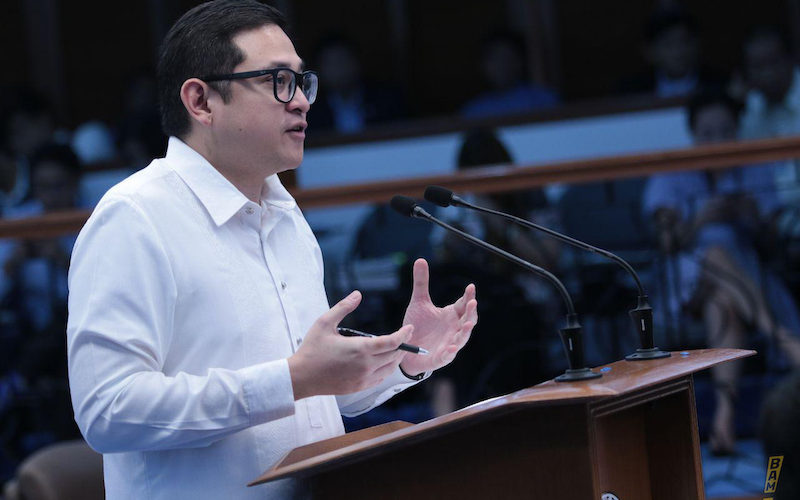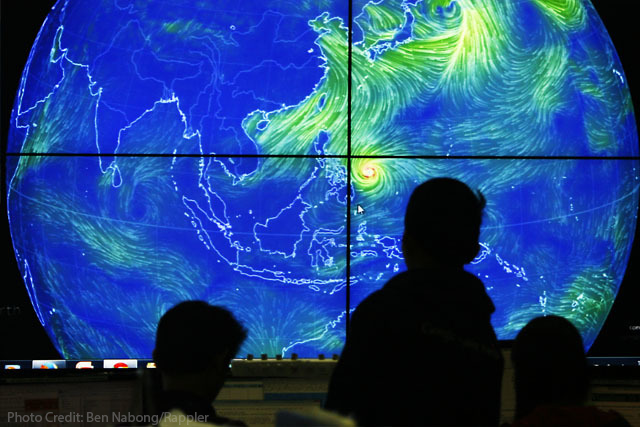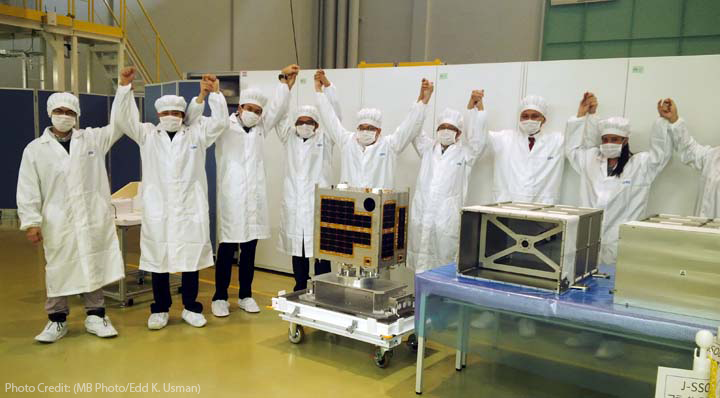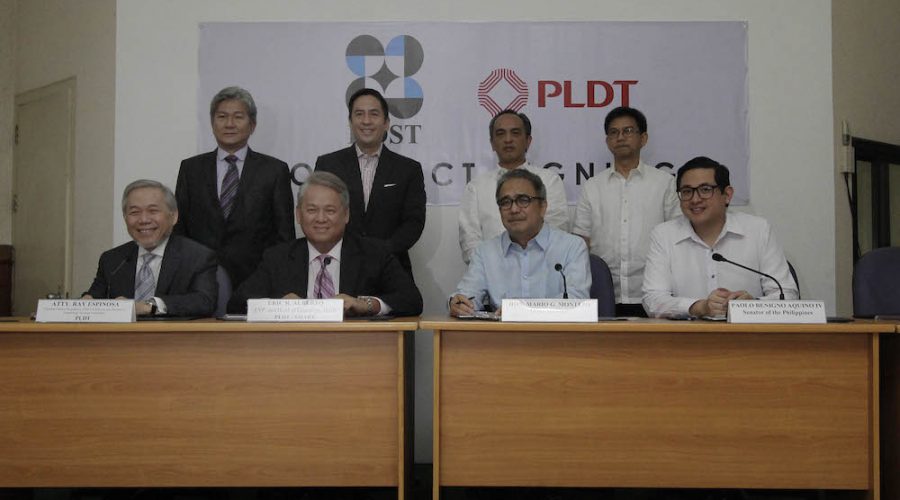DOST
Sen. Bam: Maximize Sci-Tech to address effects of storms, natural calamities
Sen. Bam: Balik Scientist Bill hurdles Senate on third and final reading
The Senate has passed on third and final reading a measure seeking to attract scientists and experts of Filipino descent residing overseas to return to the Philippines and help boost the country’s research and development, according to Sen. Bam Aquino.
Principally authored and sponsored by Sen. Bam, Senate Bill No. 1533 under Committee Report No. 143, or the Balik Scientist Bill, hurdled the third and final reading via a 13-0 vote.
“This is a step towards improving the country’s research and development sector. We must support more initiatives to empower our scientists and researchers,” said Sen. Bam, chairman of the Committee on Science and Technology.
The measure aims to provide overseas Filipino scientists with financial benefits and incentives to encourage them to return to the Philippines and help boost the country’s research and development.
It seeks to institutionalize the Balik Scientist Program of the Department of Science and Technology (DOST), which successfully encouraged some of our scientists to return and contribute to research that will help address development gaps in the Philippines.
If enacted into law, Sen. Bam hopes that it will also address the lack of science professionals caused by the exodus of scientists and researchers to other countries.
In a recent committee hearing spearheaded by Sen. Bam, it was revealed that the Philippines has 189 scientists per million, a far cry from the ideal ratio of 380 scientists per million.
Compared to other countries, the Philippines lags behind South Korea and United States, which have 5,300 and 3,500 scientists per million, respectively. Malaysia, for its part, has 2,000 scientists per million.
A Balik Scientist is a science and technology expert or professional, as certified by the DOST, who is currently or who was formerly a Filipino citizen or a foreigner of Filipino descent, residing abroad, and contracted by the government to return and serve in the Philippines along his or her field of expertise under short, medium, or long term engagement.
Sen. Bam: PH lacks 19,000 scientists, lags behind in R&D
Bam: Entice overseas Filipino scientists to return to PH, help in R&D
A senator has filed a bill seeking to provide overseas Filipino scientist with financial benefits and incentives to encourage to return to the Philippines and help boost the country’s research and development.
“Although numerous Filipino scientists would like to serve their country and contribute to our technological, social, and economic advancement, many opt to move overseas where their work is highly valued, and where there are more opportunities to conduct meaningful research,” said Sen. Bam Aquino in Senate Bill No. 1183.
Sen. Bam saw the need to entice Filipino scientists working overseas to return to the Philippines after research showed that the country produced fewer research papers and file far fewer patents with 1.8 per million population in 2010, compared to Thailand (17.6), Malaysia (43.4), and Vietnam (3.5).
“Filipino scientists have been contributing to groundbreaking advancement in scientific research all over the world with their talent, intelligence, and creativity. Yet as a country, we are lagging behind our neighbors in scientific output,” explained Sen. Bam.
According to Sen. Bam, chairman of the Committee on Science and Technology, the measure aims to institutionalize the Balik Scientist Program of the Department of Science and Technology (DOST).
Reinstated in 1993 by virtue of Executive Order No. 130, the DOST’s Balik Scientist Program has successfully encouraged some of our scientists to return and contribute to research that will address development gaps in the Philippines.
The Balik Scientist Program provides financial incentives for overseas Filipino scientists and facilitates their return to work on either a short-term or long-term basis.
The program subsidizes the cost of returning to the Philippines to impart their technical expertise to the nation, while conducting research to address our country’s needs.
“Institutionalizing this will provide financial benefits to returning overseas scientists, but more importantly, it will signify our government’s commitment to, and recognition of science, research and development,” he added.
Once enacted into law, Sen. Bam said the bill will assure Filipino scientists that their work is valued and that the government is their partner in promoting, and protecting research and development.
“It is not just Filipino scientists that stand to gain from this program, but the Filipino people, as the brightest minds pour their brain power to solving longstanding problems like poverty through science and technology,” Sen. Bam stressed.
Bam pushes for free Internet in all public schools
Believing that high-quality Internet is a crucial necessity in today’s learning environment, a senator wants to establish free Wi-Fi hotspots in all public schools to help students enhance their personal and academic development.
Sen. Bam Aquino’s Senate Bill No. 1050 seeks to establish an Internet Access Program in all public schools in the country, including State Universities and Colleges.
“Teachers and students should be given access to the Internet for meaningful research, collaboration, and learning,” said Sen. Bam, chairman of the Committee on Education, Arts and Culture in the 17th Congress.
Instead of discouraging Internet use at schools, Sen. Bam said students must be trained to engage with World Wide Web in a responsible way that furthers their personal and academic development
Under the measure, the newly-established Department of Information and Communications Technology (DICT) will be tasked to ensure that all public schools provide reliable Internet connection to students, faculty members and other non-teaching personal.
According to Sen. Bam, this Internet connection must be put up in publicly accessible areas on the premises.
As chairman of the Senate Committee on Trade, Commerce and Entrepreneurship in the 16th Congress, Sen. Bam spearheaded the investigation into the slow and expensive Internet connection in the country.
Bam pushes for support for Filipino scientists, business startups
Transcript: Bam on free Internet in public schools, support for under-appreciated scientists, and encouraging tech startups
Transcript of Sen. Bam Aquino’s interview after Committee on Science and Technology hearing
Q: When will the committee discuss Internet issues?
Sen. Bam: Dalawa ang agency under Science and Technology. You have DOST and you have the new DICT. We’re still looking for the availability of Secretary Salalima. So we will tackle that when he’s available already.
Marami sa amin ang nag-file na Wi-Fi in public facilities, pati na rin sa eskwelahan. That’s something we want to explore sa Committee on Education. Ang ating public schools at SUCs, may sapat na internet connectivity. Kasi napansin rin namin na kulang talaga iyong connectivity natin sa ating public schools and SUCs.
Q: Ano ang nakikita niyong balakid na maipasa ito?
Sen. Bam: Actually, wala akong nakikitang balakid. Unang-una pangako ng maraming mga politiko. Pangalawa, hinahanap talaga ng mga taumbayan. Ang concern ko is kung kaya nga ba ng ating telcos na bigyan ng connectivity ang ating SUCs.
We can pass it into law pero kung talagang mahina, kung talagang mabagal, eh, sayang din lang iyan. So we want to get a commitment also na kung gagawin natin ito, sigurado talaga na iyong speed, iyong bilis at access talagang mararamdaman ng taumbayan.
Q: Iyong sa Magna Carta (for Scientists), kumusta?
Sen. Bam: Alam mo, isa ito sa mga bagay-bagay na kailangan ng ating bansa para mag-progress. Iyong ating focus sa science at math, iyong ating tulong sa mga scientists, na magkaroon ng dagdag resources sa research. Ito iyong mga bagay-bagay na kailangan mangyari so we can really move forward.
Sabi nga ng mga resource speakers natin kanina, kulang talaga iyong support sa mga Filipino scientists. May mga provision na nakakabawas sa puwede nila makuha na suweldo and we want to correct all of this.
We want to make sure na ang ating Filipino scientists, hindi lang sila makabalik dito, magkaroon ng opportunities dito sa aming bansa, bagkus pati iyong mga nandito hindi na kailangan lumabas ng ating bansa. Itong Magna Carta for Scientists and Science workers, isa ito sa mga bibigyan natin ng pansin in this committee.
Q: You spent some time with the Startup Bill. How important is this for you? What’s the potential for this getting passed?
Sen. Bam: There’s a huge potential also because this is one of my pet bills and we really want to focus on this. At nakita naman natin na full support ang DOST, ang DTI, all of the agencies are fully supportive of this bill. This will hopefully unlock our digital startup community. Maraming startup sa ating bansa, magagaling, very good ideas pero nasasayang dahil nahihirapan magsimula ng negosyo. At nahihirapan sa mga regulasyon. So we want to make it easier for digital startups to start in our country, to sustain themselves eventually get to larger markets.
Isa ito sa mga gusto naming itulak ngayong 17th Congress and we find a lot of support from the private sector. Of course may Silicon Valley, ang pinakasikat na startup community sa mundo.
Mayroon din sa Israel which created Viber and Waze. We’d like to think that we have the ingredients to have a very vibrant economically viable innovative startup community. Kailangan na lang ng kaunting tulong.
And what we want to do, gusto nating tanggalin lahat ng mga balakid sa kanila. We want to make it easier for them and create that community here. And we really feel may potential sa Pilipinas. We can really do that here.
The startup community’s been here for a number of years already but this is the first time na binibigyan ng pansin ang kanilang concerns at nagsa-suggest ang gobyerno ng solutions na puwede nilang makuha upang mas mapadali ang proseso ng kanilang pagiging startup sa ating bansa.
Q: Apart from the financial incentives, ano iyong iba pang ways to help our startups?
Sen. Bam: Alam mo, marami eh. In fact, iyong financial – isang aspeto lang iyan. Iyong isang mahalaga diyan is Ease of doing business. Pagkakaroon ng paraan na ma-recognize sila, nabibigyan ng tamang benepisyo hindi lang sa pera pati rin sa personnel, pati rin sa office space or co-working spaces.
So the bill is very comprehensive. It’s more than just financial support. It tries to make it easier for people to start up their businesses. It makes it easier for foreigners to also come here para magsimula dito.
Kasi nakikita natin na maraming dayuhan na maraming karanasan sa ibang bansa na gustong magtayo ng mga negosyo dito sa startup scene.
And everytime they come here, whether they are Fil-Ams, or even foreigners mismo na napamahal sa Pilipinas. When they come here bringing their experience, mas lumalago iyong ating ecosystem.
Lumalago iyong karanasan ng mga startups dito at nagiging mas evolved sila at mas tumataas iyong level nila. We’re hoping we can also make it easier for them to set up here.
Mahalaga na may support – iyong financial support, ease of doing business at pagkakaroon ng komunidad na sila-sila rin magtulungan na ma-create nila iyong komunidad so we can compete with the rest of the world.
Q: Nabanggit niyo po -this innovative startup is not just for Filipinos?
Sen. Bam: Well, it creates space for foreigners to also set up here or they can join Filipino companies here.
Q: But don’t you think iyong competition, malamangan iyong mga Filipino startup?
Sen. Bam: Well, unang-una kasi iyong ganyang mentality – iyan iyong type of mentality na hindi nakaka-progress ang mga communities. If you look at silicon valley, if you look at other startup communities around the world, there’s competition but there’s also a lot of cooperation.
There’s also a lot of cross-learning. That’s the way that these communities really thrive, eh. Nagkakaroon ng exchange of ideas, technology and personnel. Iyan iyong paraan para talagang ma-develop iyong community. You have to allow that exchange to happen.
Yes, they’re competing with each other but through that competition, lumalabas iyong totoong galing at nagkakaroon ng cross-learning.
So, mahalaga iyon. Kung mananatili tayong isolated at insular, hindi talaga tayo mag-po-progress but if we want to be competitive, kailangan handa tayong tumanggap ng tao mula sa iba’t-ibang bansa. Makikipagkumpitensya sa kanila pero also makuha rin ang kaalaman nila.
Transcript of Interview after the IP Peering MOA signing
Q: How this agreement will benefit the public?
Sen. Bam: Ang public natin, accessing government websites, government to government transactions, mas bibilis dapat iyon kasi ngayong kasama na ang PLDT sa PHOpenIX, ibig sabihin niyan iyong data ng gobyerno, from the government side, or even from the public, hindi na kailangang umalis ng bansa, para makaabot sa mga government websites.
We’re hoping that this can help alleviate some of the concerns, iyong kabagalan, iyong latency, pagdating sa pag-access sa government websites. Again, hindi pa ito ang IP peering na ninanais natin but we’re one step closer now that a big player like PLDT is now part of the PHopenIX.
Q: For example, I’m a Filipino consumer, bibisitahin ko ang DOST website, mas mabilis na siya ngayon kumpara dati?
Sen. Bam: Dapat, once it is implemented. Noon, lalabas ka pa ng bansa. Your data goes out of the country, of course may security concerns din iyon, bago siya bumalik at makapasok sa government websites natin. Even government to government, previously, kailangan pa ring lumabas ng bansa.
This will help in terms of security, and should help in terms of quality of the service. We’re hoping this can be a good first step, simulan natin sa government websites but the goal really is lahat ng mga websites sa Pilipinas, nag-uusap-usap, nagkakaroon ng interconnectivity.
Wala pa tayo roon but the representatives of PLDT said they’ll need a few more weeks. Hopefully, within a month’s time, maayos na ang IP peering issues natin.
Q: Can you elaborate on security, di ba may mga incident ng hacking sa website? How would this prevent ang mga ganoong occurrence?
Sen. Bam: I think the first step is have the government websites host it sa PHopenIX kasi I think previous to a few years ago, kanya-kanyahan iyang web hosting.
So it’s important to have it web hosted by DOST and at the same time, iyong security measures nila, maaaring magamit ng government agencies na iyon.
Having if here plus connected na rin, hopefully gaganda na rin ang service ng public towards government website.
Q: May comment po ba kayo sa pagpasok ng Telstra sa market?
Sen. Bam: Hopefully it will help our market. Mas gaganda ang services natin, magkakaroon ng kumpetisyon, that’s important para sa kahit anong merkado.
We passed the Philippine Competition Act this year that really serves to increase competition in all of our industries. Pag mas maraming players kasi, mas maganda ang serbisyo at mas mababa ang presyo, that’s basic economics.
So with a third player coming in next year, hopefully naghahanda na rin ang current players ngayon. Kapag mas dumami ang players natin, hopefully it will provide better quality and lower cost to our consumers.
Q: Ang DICT, if posible po bang maisakatuparan ngayon?
Sen. Bam: I’m one of the ones supporting the DICT. Iyong IT sa ating bansa, nagdadala ng trabaho, nagdadala ng connectiveness sa ating mga kamag-anak, nagdadala ng tulong sa maliliit na negosyo.
Having that backbone and that infrastructure is important to our competitiveness kaya panahon nang may sariling ahensiya na nakatutok dito.
Ang focus niya, paano pababain ang presyo ng Internet, paano mas magiging connected ang mga kababayan natin.
Most of our connectedness is in the urban areas, pagdating mo sa rural areas, mahina ang signal, mabagal ang Internet kaya mahalagang magkaroon ng agency na focused talaga dito.
Sen. Bam Aquino’s Speech during the IP Peering MOA Signing
“Magandang umaga po sa ating lahat. Definitely, today is a big step towards achieving our goals of having improved Internet services in the Philippines.
Ngayon po, all of our government websites, at least majority of our government websites, are locally peered.
This means, now that PLDT is connected to the PHOpenIX, our government data, any g to g data doesn’t have to leave the Philippines and can actually just travel locally among our shores.
Can you imagine the issues on national security previous to this day and this partnership? Before, government data had to travel outside of the country and come back to our shores to be able to get back to other government websites.
Today definitely is a huge day and we would like to thank PLDT and DOST for finally working out this partnership. Definitely, we can all sleep more soundly tonight now that this partnership is done.
Malaking bagay po na ang huge player like PLDT is now connected to the PHOpenIX. It does open a lot of opportunities in the future. At the minimum, our government sites are safer and of course would be more efficient Of course, this partnership does open the doors for other partnerships down the line.
What I’ve been harping about IP peering in the Senate hearings regarding IP peering, I think, we’re one step closer to that with this MOA signing.
Hopefully there will be another great announcement before the end of the year when it comes to full IP peering in the Philippines.
Today is definitely a good step, a big step and along the way of trying to improve Internet services in the Philippines, this is one of those days that we will remember as a banner day to be able to get to the goals that we want for our country.
More and more, lumalabas talaga na ang competitiveness of our country, a large part of it, in the next five to 10 years, if not the next two to three years, will be dependent on how good our Internet infrastructure is.
We’re hoping that together, we can really build a much improved Internet infrastructure in the Philippines.
We have a long way to go definitely, but sabi nga nila, each journey begins with one step and this is definitely a good step in the right direction.”




Recent Comments